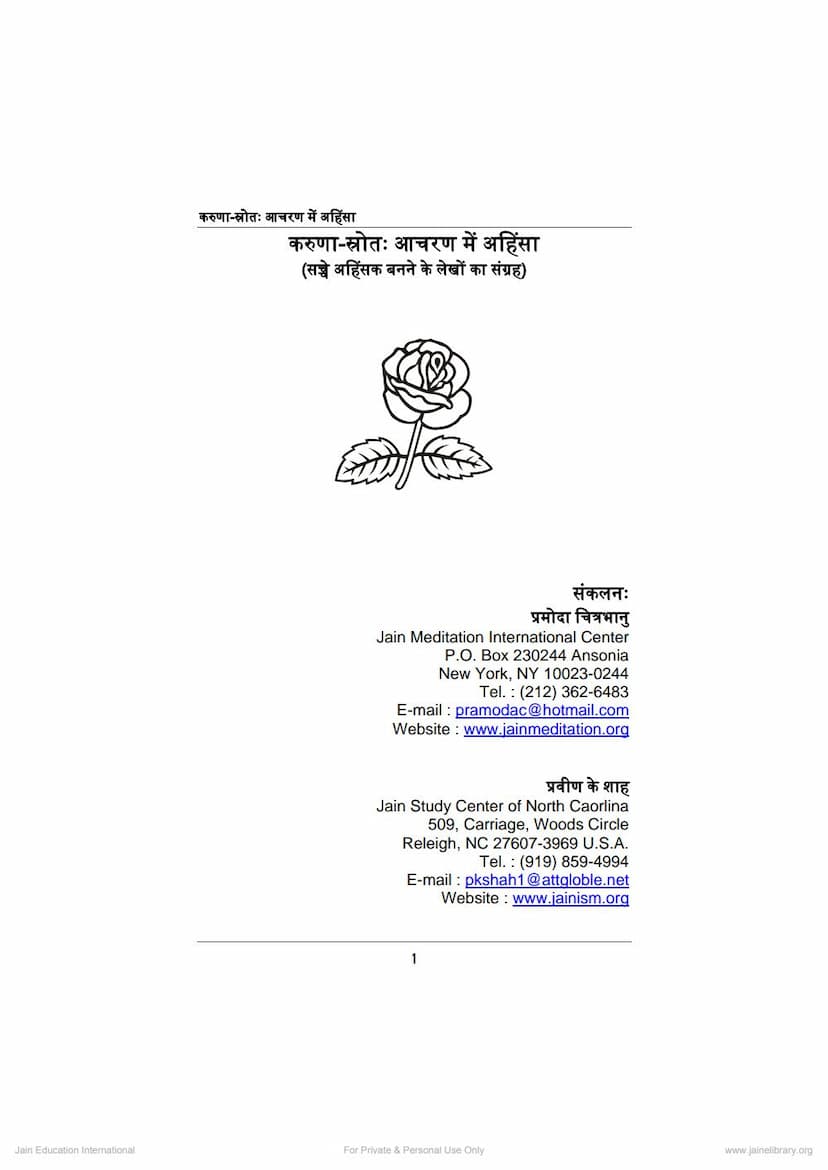JES 921H Karuna Me Srot Acharan Me Ahimsa Reference Book
Added to library: September 1, 2025

Summary
This Jain text, titled "$JES 921H Karuna me Srot Acharan me Ahimsa Reference Book" (which translates to "Karuna: Ahimsa in Action Reference Book"), is a compilation of articles aimed at promoting Ahimsa (non-violence) and Karuna (compassion) in daily life, particularly concerning animal welfare. Authored by Pramoda Chitrabhanu and Pravin K. Shah, and published by the JAINA Education Committee, the book argues for a deeper understanding and practice of Jain principles in relation to animal exploitation, especially within the dairy industry and slaughterhouses.
The book critically examines the realities of animal use, highlighting the suffering and ethical concerns associated with dairy products, eggs, silk, and other animal-derived materials. It emphasizes that true compassion extends to all living beings, urging readers to move beyond mere emotional sympathy to a tangible commitment to non-violence in their actions and consumption.
Key themes and arguments presented in the book include:
- The Cruelty of the Dairy Industry: The book details the harsh conditions and practices in dairy farms, both in the US and India. It describes how cows are continuously impregnated to maximize milk production, how male calves are often separated from their mothers shortly after birth and sent to slaughter, and how cows are treated as mere production units rather than sentient beings. The authors expose the pain and suffering inflicted on these animals, including forced insemination, confinement in unsanitary conditions, and early termination of their natural lifespan.
- The Reality of Slaughterhouses: The book provides a stark portrayal of the processes in slaughterhouses, detailing the grim fate of animals after their perceived utility in the dairy or meat industries ends. It highlights how various parts of the animals are utilized for a wide range of products, from food and cosmetics to industrial materials, underscoring the sheer scale of animal exploitation.
- Health and Environmental Concerns: The text argues that dairy products and animal consumption are detrimental not only to animal welfare but also to human health and the environment. It discusses the links between dairy consumption and health issues like osteoporosis, heart disease, and certain cancers, while also highlighting the significant environmental impact of animal agriculture, including water usage, land degradation, and greenhouse gas emissions.
- The Jain Perspective on Ahimsa: The book strongly advocates for vegetarianism and veganism from a Jain ethical standpoint. It explains that Jainism's highest principle is Ahimsa, and that even for lay followers (shravaks/shravikas), causing harm to sentient beings (trasa jivas) is forbidden. The book calls for a re-evaluation of the use of animal products in religious rituals and temples, emphasizing that the source of these materials should be free from cruelty and exploitation.
- Alternatives and Cruelty-Free Living: The book provides extensive information on vegetarian and vegan alternatives for food, clothing, and personal care products. It encourages readers to make conscious choices that minimize harm to animals and promote a more compassionate lifestyle.
- The Role of Information and Awareness: The authors stress the importance of shedding light on the often-hidden realities of animal exploitation to raise public awareness and inspire change. They highlight the contributions of various organizations and individuals who are dedicated to animal welfare and promoting a non-violent way of life.
- Personal Transformation: The book features testimonials from readers who were moved by the information presented, leading them to adopt vegetarian or vegan lifestyles. These personal accounts underscore the transformative power of understanding the ethical implications of one's dietary choices.
In essence, "$JES 921H Karuna me Srot Acharan me Ahimsa Reference Book" serves as a comprehensive guide and a call to action for Jains and others who wish to live a life rooted in compassion and non-violence, extending this ethical framework to their dietary choices, consumption patterns, and overall interactions with the animal kingdom.